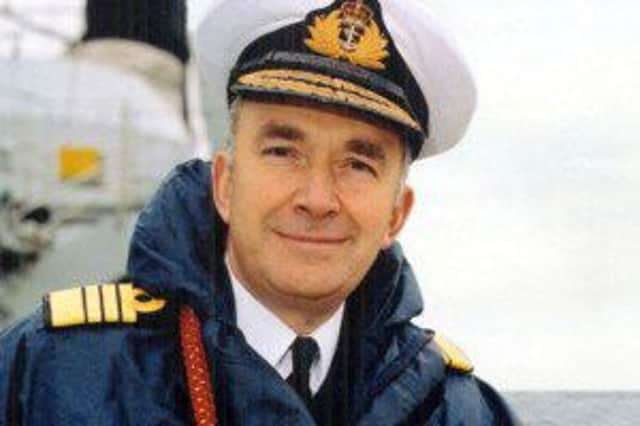Former First Sea Lord says '˜self-delusional' government must spend more on defence


‘Our forces remain underfunded,’ he told the House of Lords. ‘Despite what the defence secretary says there is minimal new money.
‘Spending on pensions does not win wars. The 2 per cent of GDP is not a target but the very minimum any Nato nation should spend and I believe our nation should spend more.’
Advertisement
Hide AdAdvertisement
Hide AdLord West said the Navy had been underfunded by £250 million a year for the last three years and now required an ‘uplift’ in personnel of about 3,000.
He spoke as another former UK military chief warned in the Lords debate that spending 2 per cent of GDP on defence is a bare minimum and not the reaching of a fundraising target to be celebrated.
Lord Stirrup, who served as chief of defence staff from 2006 to 2010, branded current funding for security as ‘woefully inadequate’ given the international threats faced.
The independent crossbencher said the 2per cent spending target for Nato members was meant as a ‘baseline against which one can measure delinquency’ and argued Britain should be spending 3per cent.
Advertisement
Hide AdAdvertisement
Hide AdLord Stirrup issued his stark message during a debate in the House of Lords on the UK’s armed forces and the Nato military alliance.
On the 2 per cent spending target, he told peers: ‘It is a bare minimum designed to provide a clear baseline against which one can measure delinquency.
‘It’s not like some fundraising target which we should celebrate reaching.’
Lord Stirrup also cautioned Labour that the present Conservative Government was ‘far from the only one to have used creative accounting when it comes to defence expenditure’.
Advertisement
Hide AdAdvertisement
Hide AdHe added: ‘In any event, the UK’s commitment to the 2per cent floor merely raises us above the level of those who should be named and shamed.
‘It does not imply an adequate level of investment in our future security.
‘Indeed I would argue our public expenditure on security remains woefully inadequate in light of the present challenges to international order.’
Arguing that the military was ‘spread too thin’, Lord Stirrup said: ‘We ought to be spending more like 3per cent of GDP on defence, not just the minimum of 2per cent.’
Advertisement
Hide AdAdvertisement
Hide AdHe said: ‘Successive governments have paid lip service to the fact that preserving the safety and security of their citizens is their priority.
‘But their actions, particularly in spending decisions, have said otherwise.’
He acknowledged the Government had ‘reversed the miserable downward trend of investment’ in recent years, but said it must do more.
‘We can and should set the example for others. It’s clearly in our interests to do so,’ he added.
Advertisement
Hide AdAdvertisement
Hide AdOpening the debate, defence minister Earl Howe said nearly seven decades after its formation, Nato ‘remains as relevant as ever’, which was why the UK continued to meet the 2per cent GDP target.
He added: ‘However, the alliance is only as strong as its weakest link.
‘It’s not enough for us to pull out all the stops, we need other nations to up their game.’
He argued US President Donald Trump had been right in his demand that ‘it was time for the allies to pay their way’.
‘US taxpayers can’t subsidise European defence,’ he said.
Advertisement
Hide AdAdvertisement
Hide AdLord Howe added: ‘Currently 10 of the 28 EU member states are failing to spend 1.5per cent of GDP on defence. Five, by no means the poorest five, don’t even spend 1per cent.’
Opposition spokesman and former defence minister Lord Touhig pointed out it was a Labour foreign secretary who had been ‘midwife of that birth’ of Nato.
He insisted: ‘Nato remains the bedrock of our defence.’
While Lord Touhig agreed members should spend 2per cent of GDP on defence, he disputed Mr Trump’s claims made during the US election that the military alliance was ‘obsolete, irrelevant and out of date’.
Tory former defence minister Lord Astor of Hever hit out at the unbalanced and ‘unjust’ treatment of soldiers who served in Northern Ireland during the Troubles.
Advertisement
Hide AdAdvertisement
Hide AdLord Astor, a former lieutenant in the Life Guards who served in Northern Ireland, said the armed forces paid a huge price for restoring order and had conducted themselves to the ‘highest possible professional standards’.
Criticising the handling of so called ‘legacy issues,’ he asked: ‘Is it really fair that the alleged misdeeds of soldiers over 40 years ago should face trial while perpetrators of terrorist activities are ignored and their victims forgotten.
‘I feel the whole system of addressing the past in Northern Ireland is not balanced and is unjust.’
Lord Walker of Aldringham, a former chief of defence staff and an independent crossbencher, pointed one of the main areas being targeted for military savings was from personnel, with a squeeze on pay and allowances.
Advertisement
Hide AdAdvertisement
Hide AdCombined with the threat of legal action faced by troops and concerns about service accommodation, Lord Walker said: ‘I believe we need to do better for our people, for it seems our country still seeks to be best defended by those who owe it the least.’